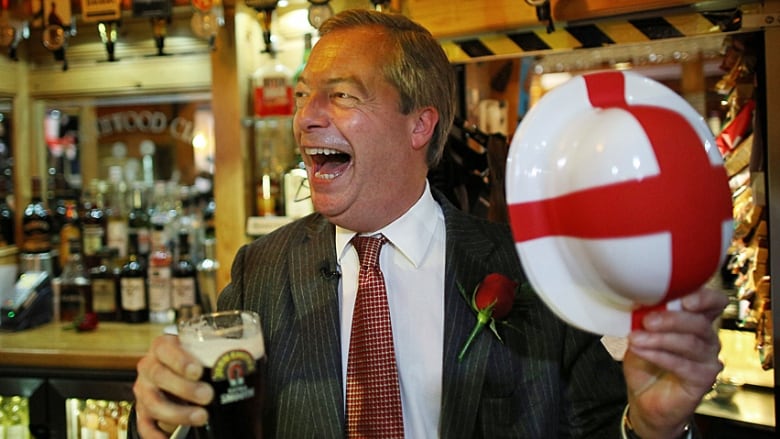U.K. election 2015: bumpy, fractious, as hated as Marmite
British parties are bracing for a messy result on May 7, and why not, it's been a messy campaign

There is something that doesn't quite add up about Ed Miliband, surely one of Britain's most awkward politicians, suddenly emerging as the darling of thousands of fawning young women in the dying days of a lacklustre national election campaign.
Then again, there have been even odder moments surrounding this whole campaign.
- Miliband bristles at 'North London geek' tag in election show
- U.K. election: Seven party leaders debate
Britons apparently stack two of the parties on offer — Nigel Farage's UKIP and David Cameron's Conservatives — as among the country's most hated brands, ahead even of Marmite, a questionably palatable spread made of yeast extract.
Of course, with more parties now vying for votes, it was inevitable that the lead-up to Britain's May 7 election would be as unpredictable and messy as the anticipated outcome.
The latest BBC "Poll of Polls" shows no party anywhere near a majority — the ruling Conservatives are at 34 per cent, Labour at 33, UKIP at 13, and the Liberal Democrats at nine.
If those numbers hold as expected, the fractured post-election landscape will be unlike anything modern Britain has ever seen. And the campaign will be just as memorable.
Who could have imagined, for instance, the Scottish National Party's Nicola Sturgeon, pictured as Princess Leia of Star Wars fame, on the front page of the supportive Scottish Sun, while its sister paper backed the Tories?
Or that Miliband, who once infamously looked anything but ordinary trying to tackle a bacon sandwich (in an effort to look ordinary), would trend on Twitter, thanks to the "Milifans" who call him a "cutie" fit for a crown of flowers?

Who could have anticipated his campaign bus being mobbed by a hen party demanding Miliband (who looked terrified) emerge for selfies?
Not bad, though, for a politician who was recently described, together with his Tory rival, David Cameron, as "drabness personified."
For Cameron, that description was inadvertently underlined in a photo-op gone awry when a young schoolgirl did a face plant as the prime minister was reading her a story.
Cameron, however, might at least derive some satisfaction that his party is not Britain's most hated brand.
The euro-skeptic UKIP, as the topper in that peculiar contest, has arguably had the bumpiest campaign of all.
Farage's bumpy ride
The UK Independence Party's Farage has long raised eyebrows here with his smokes, pints and pointed barbs.
But he also raised alarm bells among the traditional parties when UKIP managed to win two national byelections last fall; and grabbed 27.49 of the vote for the European Parliament earlier in the year.
In this campaign, he's had to contend with lower numbers, but many more mishaps.
One of his candidates described Islam as an "evil cult." Another — prior to the campaign — admitted to "having a problem" with people of African origin.
It also emerged that the party's vice-chairman moonlighted as a porn star and as a porn promoter known as "Johnny Rockard" in a firm reportedly specializing in the "British girl next door."

With only a week left before the vote, Farage, who once met with former Reform Party leader Preston Manning in a bid to emulate that party's successful anti-Conservative Party insurgency, hasn't quite lived up to the hype he generated at the outset of this campaign.
He is apparently even battling for his own riding of Thanet South in what's being described as an uncomfortably close race.
Frankenstein?
Each of the leaders has detractors. Early in the campaign Cameron was serenaded by a ukulele player who sang "F*** off back to Eton."
But unlike the other leaders, Farage also has the unique challenge of an unflattering, constant critique coming from the founder of his relatively new party.
"I've compared myself to Dr. Frankenstein, with his monster on the rampage," Alan Sked, who founded UKIP in 1993, told CBC News. "I feel a responsibility for what the monster does.
"And I want to point out it wasn't always like that."
"He [Farage] doesn't talk about the democratic deficit…he doesn't talk about patterns of trade. All he says is 'we have to get our country back, we have to control our borders.'"
UKIP's current leadership insists it is not racist as Sked and others allege — Farage argues Britain should adopt a points system for immigrants like Australia has. And UKIP defenders point to a clause in its constitution that says the party does not discriminate on the grounds of race or religion.
Farage's anti-immigration vitriol, however, has landed him in some awkward spots, like that moment when he was captured laughing nervously as he was being photographed with a Hungarian man who barely spoke English.
Mostly controversially, Farage said that the EU's asylum policy was a "direct threat to our civilization."
The immigration debate he sparked has spawned a backlash in some quarters, generating protests, crowd-funded anti-UKIP campaigns, even a parody band.

One Pakistan-born comic, who came to Britain as a teenager, organized a comedy evening last week to try to counter the renewed negativity about immigrants.
"What I'm worried about is after the seventh of May, what we're going to wake up to," says Sajeela Kershi.
According to analysts, UKIP's support is highest in communities that actually have the lowest numbers of immigrants — like Thanet South.
And yet, he's had to spend quite a lot of time there to shore up support. Farage has promised that if he can't manage to win his own seat, he will quit as party leader.
Farage is adamant it won't come to that. And while UKIP and the Tories came ahead of Marmite in the ranking of hated brands, the others weren't far behind: Labour and the Liberal Democrats were in the fifth and sixth positions respectively.

